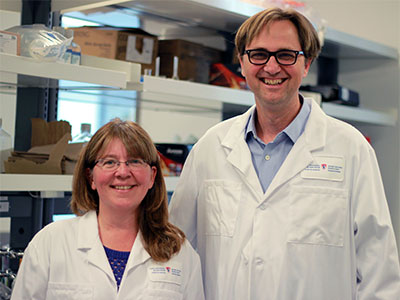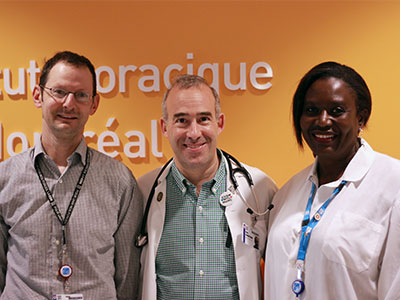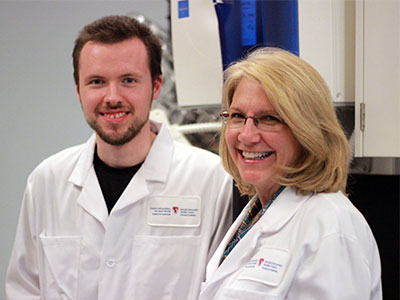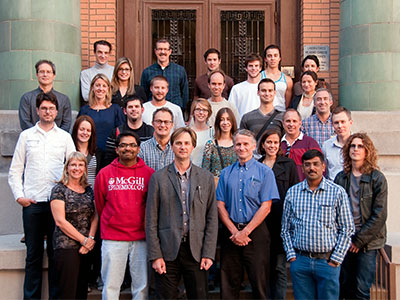The McGill International TB Centre at the RI-MUHC
Tuberculosis affects nine million people a year worldwide and is the second leading infectious cause of death after HIV/AIDS. Although relatively uncommon in the general Canadian population, TB is a significant public health problem in aboriginal communities in the Far North and in areas within Canada’s largest cities.
To fight this disease, it takes passionate, committed scientists and healthcare workers with a wide range of expertise. The McGill International TB Centre based at the Research Institute of the McGill University Health Centre (RI-MUHC) has succeeded in bringing together over 20 world researchers who collaborate closely to better understand, diagnose and treat TB and other mycobacterial diseases.
The strength of our centre is that we have a diverse range of people conducting research and outreach activities, from basic biomedical research, such as the study of DNA and its relation to infection, to epidemiological clinical trials examining the cost and effectiveness of different interventions in the field,” says Dr. Marcel Behr, director of the McGill International Tuberculosis (TB) Centre, MUHC microbiologist-in-chief and associate leader of the Infectious Diseases and Immunity in Global Health Program at the RI-MUHC.
The centre promotes the close interaction between research and clinical practice. For 20 years, Dr. Kevin Schwartzman, director of the MUHC’s Adult Respiratory Division, has been studying the epidemiology of tuberculosis in Montreal. His research also focuses on cost-effective ways to screen and prevent TB within the immigrant population.
“Our studies have shown that it’s more cost effective to invest in TB control in the countries of origin of immigrants than to tighten screening methods in Canada,” says Dr. Schwartzman, who is also professor at McGill University’s Faculty of Medicine. “That has influenced policy and, as a result, clinical practice and screening policies have been changed and investments in TB control overseas have been increased.”
Another key example is work done by Dr. Madhukar Pai, associate director of the McGill International TB Centre, that has shown the limitations of some of diagnostic tests for latent TB infection. His studies have directly shaped Canadian TB practice guidelines and influenced usage and interpretation of certain diagnostic tests.
The TB Centre is also expanding as a high-level training facility. Besides welcoming trainees to work in laboratories and clinical or epidemiological projects, it offers them a variety of activities, including intensive advanced courses on TB research through the McGill Summer Institute in Infectious Diseases & Global Health.
“Students are attracted by the world class reputation of the centre and of our members, who are dedicated, passionate people, enthusiastic about their research,” says Lynn Dery Capes, program manager of the McGill International TB Centre.
Bringing world-class research to Northern Canada
Besides coordinating training activities, meetings and special events, Dery Capes is responsible for the very important task of finding grant opportunities for the centre. One such grant, from the Canadian Institutes of Health Research (CIHR), allowed members of the centre to carry out research in Nunavik during an outbreak of tuberculosis in the North of Quebec in 2011-2012.
“These northern communities, which are part of the McGill University’s Réseau universitaire intégré de santé (RUIS), have the highest rates of TB and other infectious diseases in the province,” says Dr. Behr. “We were able to visit the village, do questionnaires and surveys and take bacteria samples to try to determine not only the underlying root causes of the outbreak, but also the potential risk factors for the ongoing transmission of TB in the North.”
Looking ahead
The ‘ideal next step’ for the centre, according to Dr. Behr, would be to consolidate a training structure to welcome graduate students and postdoctoral fellows from abroad.
“By fostering the recruitment of future researchers from other parts of the world to come learn with us, we can in turn better contribute to the world’s TB research efforts,” says Dr. Behr. Based on their excellent start and their world-class reputation, expectations are high.
 | Fiona McIntosh, manager of Containment Level 3 (CL3) for the Tuberculosis Research facility, and Dr. Marcel Behr, director of The McGill International TB Centre and MUHC microbiologist-in-chief. “The CL3 lab meets the highest safety standards defined by Canadian guidelines and is an important resource for TB research. It allows us to work with live Mycobacterium tuberculosis bacteria and to do highly detailed immunologic studies.” — Dr. Marcel Behr |
 | Denis Francis, nurse clinician at the MUHC Tuberculosis Program, Dr. Kevin Schwartzman, director of the MUHC’s Adult Respiratory Division and professor at McGill University’s Faculty of Medicine and RI-MUHC clinical-researcher, and Amélie Fosso, nurse clinician at the MUHC Tuberculosis Program. “There’s a tight link to clinical and epidemiological research at the MUHC. Many of the patients we see at the Montreal Chest Institute are recruited for research studies.” – Dr. Kevin Schwartzman |
 | Jean-Yves Dubé, Masters student in the Department of Microbiology and Immunology at McGill University and at the RI-MUHC, and Lynn Dery Capes, program manager of the McGill International TB Centre. “Research focuses on the clinical and economic evaluation of interventions in tuberculosis and other respiratory diseases in addition to research on the local epidemiology of tuberculosis in Montreal, including spatial and geographic aspects.” – Lynn Dery Capes |
 | Members of the McGill International TB Centre based at the Research Institute of the McGill University Health Centre (RI-MUHC) span widely different disciplines, but are united in their desire to better understand, diagnose and treat tuberculosis. |
